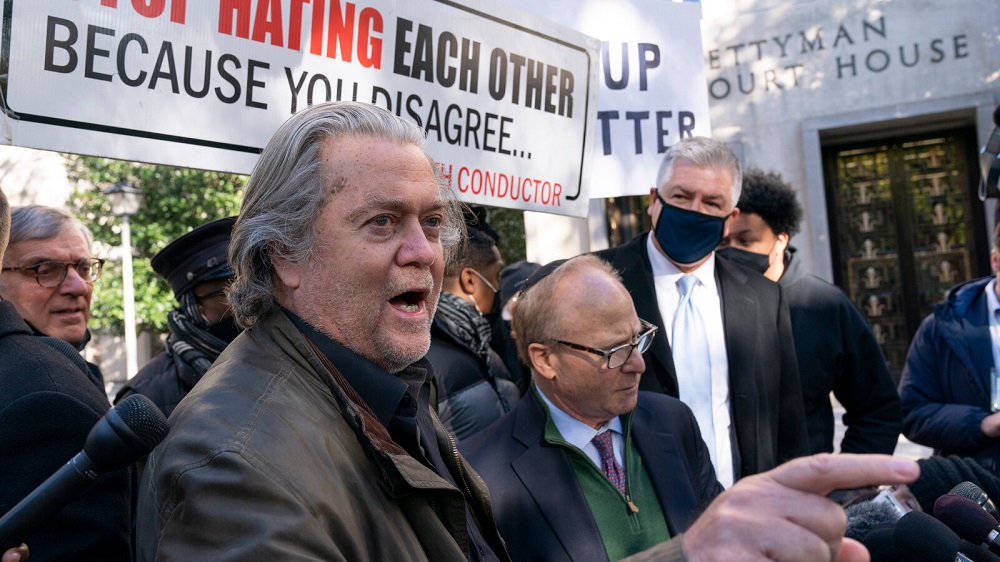
OPINION: This article contains commentary which may reflect the author’s opinion
The Justice Department has been ordered to provide internal documents associated with its decision to prosecute former Trump adviser Steve Bannon. This is a victory for Bannon, who maintains that he had a valid legal basis for refusing to obey a subpoena from the House’s Jan. 6 special panel.
U.S. District Court Judge Carl Nichols ordered the Justice Department to provide Bannon’s team with “statements or writings” that demonstrate how the decision to charge Bannon with contempt of Congress square with longstanding legal opinions of the Justice Department that hold that former presidential advisers are generally exempt from congressional subpoenas.
On the contrary, prosecutors argued in a two-hour hearing that the Justice Department’s legal guidance, in the form of opinions issued by the Office of Legal Counsel, is irrelevant to whether Bannon committed the contempt-of-Congress crimes charged against him. Attorneys for Bannon, however, emphasized that they repeatedly instructed him not to comply with the congressional subpoena because it was invalid under the department’s policy.
Mr. Nichols mentioned a hypothetical scenario in which Congress summoned Joe Biden’s chief of staff, Ron Klain. His reasoning is that Klain could refuse to appear, citing opinions published by the Office of Legislative Counsel saying that senior advisers are not subject to compelled congressional testimony. Klain, however, could still be prosecuted under the Justice Department’s case in the Bannon case – resulting in a conflict between the department’s internal policies and its prosecutorial decisions.
“Those two positions would be held at the same time,” said Nichols, a Trump appointee.
It may be possible to learn from the documents that the Justice Department provides how it reconciled this inherent conflict, or whether it has issued subsequent, nonpublic legal guidance that would permit the prosecution of Bannon.
The opinions of the OLC that limit Congress’ ability to require testimony from executive branch officials have been a significant roadblock to lawmakers for decades, even though they bear no formal legal weight.
Trump repeatedly used them to derail investigations into his attempts to press Ukraine into investigating his political rivals and his handling of the special counsel investigation into Russian interference in the 2016 election.
Opinions issued under Biden are still on the books, though superseding opinions may have been issued. Bannon must receive those documents, regardless of whether they are public or not, according to Nichols’ order.
During the George W. Bush administration, Nichols was an attorney for the Justice Department and argued for comprehensive immunity for presidential advisers, even those who had left the administration, from being forced to discuss their official work with Congress – a decision rejected by a federal judge in 2008. Bannon’s lead prosecutor, Amanda Vaughn, pointed out that courts had sometimes rejected OLC arguments, and Nichols replied, “I know of one case very well.”
As a result of Bannon’s unique defiance of the select committee’s request for documents and testimony, the committee held Bannon in contempt in October. Three weeks later, the Justice Department brought two contempt charges against him. Bannon was subpoenaed in September by the select committee, because it believes he played a role in events that preceded the attack on the Capitol on Jan. 6, 2021. In the days leading up to Jan. 6, Bannon predicted chaos on his podcast as members of a “war room” sought to pressure Congress to reject Joe Biden’s electors.
Bannon described the prosecution and the entire Jan. 6 select committee process as sideshows while he was outside the courthouse on Wednesday.
Steve Bannon vows to “take down the illegitimate Biden regime” seconds before walking into U.S. District Court where he is facing contempt of Congress charges over Jan. 6. pic.twitter.com/NQ7zEgiTfW
— David Edwards (@DavidEdwards) March 16, 2022
“All of this is noise,” he said in the company of lawyers Evan Corcoran, Robert Costello and David Schoen. The former White House strategist said he considered the Biden administration “illegitimate” and said he is working to destroy the Democratic Party during the midterm elections.
A federal judge was set to hear arguments in a case against Bannon on Wednesday, as the former Trump adviser vowed to “take down” Biden.
Before entering the District Court, Bannon broadcast a live stream on his Gettr account.
“This is all noise,” he said to his viewers. “We are dedicated to take down the illegitimate Biden regime and stop it in its tracks every day of the week. And we’re doing a pretty good job.”
According to him, his second objective is “to destroy the Democratic Party as a national political institution root and branch.”
“A populist, nationalist uprising at the polls to take down the Democratic Party!” he declared.
Additionally, before he walked into court, Bannon promised to “destroy” the Chinese Communist Party.
Investigators working on the contempt-of-Congress case against Steve Bannon said Monday that they inadvertently ensnared similar records of other individuals bearing the same name as Robert Costello, Bannon’s lawyer, in their search.
The error was not relevant to the broader case, they argued in a 10-page court filing Monday night – which came as the Justice Department sought evidence of Costello’s communications with Bannon in response to a subpoena issued by the select committee on Jan. 6.
Source: The Republic Brief